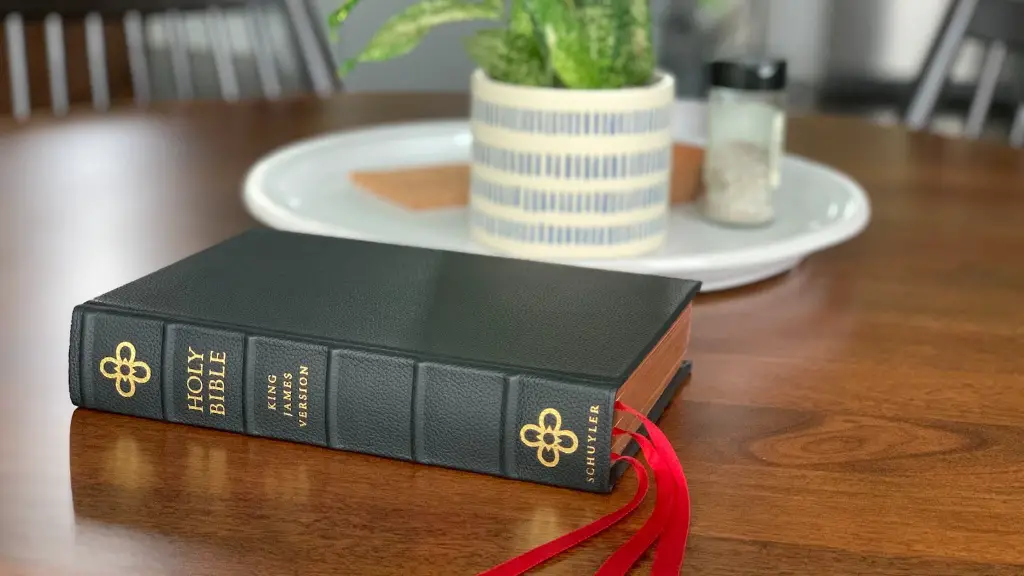As humans, we are often driven by the need to know who we are and where we come from. For believers in the Bible, this need extends further to discovering who we are in the Bible and understand our place in spiritual matters. The Bible is a spiritual book that speaks of our personal relationship with God and the role we can play in His kingdom. Reading the Bible can give us a better understanding of our identity, purpose, and destiny.
The concept of ‘who am I in the Bible?’ can be difficult to pin down as it is both a unique and a deeply personal exploration. This can leave many feeling overwhelmed, unsure of where to start or of the right questions to ask. To answer ‘who am I in the Bible?’, the Bible provides valuable guidance and insight into our identity, purpose and relationship with God.
First and foremost, one needs to read and contemplate the Bible as a whole to gain a clear sense of who God is and how He views us, as individuals, and as part of a larger collective. A number of scriptures from the Old and New Testament provide a framework for one’s identity. For example, in the Old Testament, God tells Moses that he is his people’s liberator and that he should lead them to the Promised Land. Similarly, in the New Testament, God tells Jesus that his mission is to bring redemption to the world and to be a light of hope in a world of darkness.
The Bible offers further insight into our identity as believers in God. In Genesis 1-3, we are reminded that we are created in the image of God with a purpose and are given a choice to be obedient to his commands. Similarly, in Proverbs, we learn that we are each gifted in certain ways, and we can use our talents for the greater good. Ephesians further clarifies how God’s love for us is unconditional and that he offers us divine grace and salvation.
We also learn, in Romans 8 and 12, that we are called to be faithful to the Lord and to demonstrate our faith through our action and thought. Moreover, in Colossians, we are reminded that our identity is found in Christ Jesus and that we are called to live lives firmly rooted in His being. In short, the Bible helps us to answer the question of ‘who am I in the Bible?’ by confirming that we are made in the image of God, called to use our gifts, and have an eternal destiny in Heaven.
Importantly, we should constantly strive to read and understand the Bible so that we can apply its teachings to our everyday lives. The Bible is not just a book of stories but rather a source of wisdom and insight into the spiritual life. As such, it is essential to take time to meditate and reflect on God’s words so that we can know who we are in the Bible.
Sinner or Saint?
Although the Bible is clear that we are still sinners, and do not deserve to be saved due to our poor choices, God’s grace and mercy allows us to still be accepted in his kingdom. As Romans 3:23-25 says: “For all have sinned and fall short of the glory of God, and all are justified freely by his grace through the redemption that came by Christ Jesus.” Our relationship with God, then, is profoundly impacted by our forgiveness and acceptance through Jesus.
This means that although we may still be sinners, God gives us the opportunity to choose to be forgiven and to live a life in harmony with him — even through our own sin. Paul writes in Galatians 5:1: “It is for freedom that Christ has set us free. Stand firm, then, and do not let yourselves be burdened again by a yoke of slavery.” We can become saints and work for the betterment of all in service of his name.
Living A Life Of Faith
The Bible encourages us to live our lives according to faith, trust and obedience. Through this, we can gain strength, courage, and peace in our daily lives and create a more solid relationship with God. In Mathew 19:26, Jesus said: “With man this is impossible, but not with God; all things are possible with God.” We can put our faith in God and allow Him to give us the courage and strength to become the people He intends us to be.
Furthermore, choosing to live a life of faith also allows us to stay focused on the bigger picture and to not be swayed by external forces or our own desires. The Bible is a constant reminder that we can only fulfill our purpose in life through accepting God’s will in our lives and staying open to His guidance. Psalms 37:4-5 offers sound advice on living our lives according to his plan, “Delight in the Lord, and he will give you the desires of your heart. Commit your way to the Lord; trust in him and he will do this.”
Questions Lead To Answers
Any spiritual journey starts with a willingness to seek out God’s truth. Answering the question of “who am I in the Bible?” requires us to be diligent in our pursuits, to reject any doubts and feelings of uncertainty, and to then ask the right questions. Asking ourselves questions such as “What gifts has God given me?” “What has Jesus saved me from?” and “How do I show my love, devotion, and service to God?” can help get our journey moving.
Additionally, following and setting a spiritual routine can be a powerful way to further explore our identity and purpose. Setting time aside to read the Bible, praying, or attending church are just some of the ways we can get closer to God and learn more about ourselves. Overall, the answer to coming to terms with “who am I in the Bible?” requires us to take the initiative in our spiritual journey, be mindful of our feelings, and constantly remind ourselves of who God is and how he sees us.
A Path Back To God
Ultimately, the journey to finding out who we are in the Bible is a deeply personal one. Each of us has a unique role to play in our relationship with God, and reading and meditating on the Bible can help us find our place and understand better what God wants us to do.
Repentance, patience, and obedience towards God’s plan are vital elements to leading a life of faith; and as we continue to read and draw closer to God, He is always ready to show us the path back to Him. In Psalm 25:4-5, we’re told this, “Show me your ways, Lord, teach me your paths. Guide me in your truth and teach me, for you are God my Savior, and my hope is in you all day long.” In this way, God can help us answer who we are in the Bible and show us our unique purpose in life.
Consequences and Blessings
The results of our spiritual journeys to find out who we are in the Bible have steadfast consequences. If we choose to live our lives according to God’s word, then we are blessed with peace, freedom, and joy in our lives, relationships, and businesses. If we choose to follow our own egoistic desires, then our lives become burdened with darkness, fear, and sadness. What we have to remember is that God will still be there, but He won’t stop the consequences of our choices — this is why it is so important to continuously read the Bible and remain close to him.
Moreover, if we stay focused on the promises given in the Bible, then our lives will be immovably rooted in faith and joy. Ultimately, our connection to God will be strong and we will be able to understand more and more our place in His kingdom. Philippians 4:13 speaks of doing this, “I can do all things through Christ who strengthens me.” It is this confident belief that God wants only the best for us and has a plan for our lives that can give us the courage and strength to learn who we are in the Bible.
A Lasting Legacy
Regardless of our age, gender, culture, or life experience, we all have a place in the Bible and a purpose in his kingdom. Through our understanding of the scriptures and a willingness to be obedient to His commands, we can gain a deeper insight into who we are and what God is calling us to do. The Bible tells us this in 2 Corinthians 5:17, “Therefore, if anyone is in Christ, he is a new creation; old things have passed away; behold, all things become new.”
As we develop our identities in the Bible, we should remember that our spiritual walk will be dependent on our relationship with God. If we nurture our connection with Him every day, lovingly receive His grace, and choose to stay obedient to His will — we will soon understand who we are in the Bible, and we’ll better understand how to share our identity and legacy with others.




